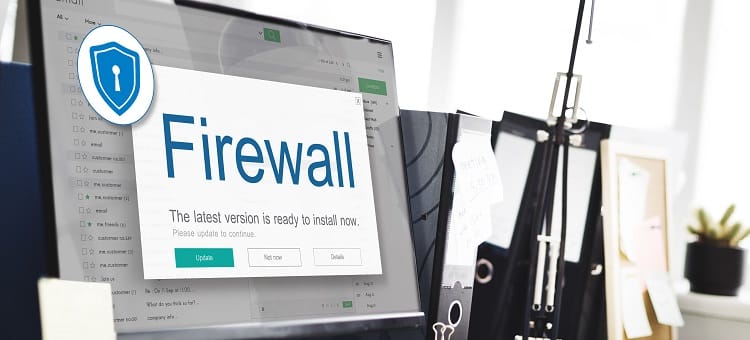Did you know around 15 million data breaches were reported in the third quarter of 2022? The increasing threat of cybercrimes has made data security a priority for every business operating digitally.
Implementing robust technology that can guard your network and data from unauthorized access has become important, more now than ever. A firewall is one such way to protect your data and mitigate the risks of breaches within your organization. Your IT help desk can help you implement a firewall for network security.
In this post, we’ve explained the firewall, how it protects your network, and why every company should consider investing in it. Read on.
What Firewalls Do?
Think of a firewall as a guard standing by your company’s entrance and guarding your property against intruders. They scan and verify the IDs of each employee before letting them in. That’s what a firewall does for your organization.
It guards your network against outsiders. It allows seamless communication among the company’s internal members or authorized users but blocks access to a third party. On an individual level, a firewall offers protection against a hacker who might be trying to launch a malicious application on your system.
According to Business Wire, the firewall market is expected to grow by $304 billion by 2026. The market will keep growing as there’s an increasing demand for network security. Let’s check out a few ways firewalls protect your network.
6 Ways How Firewall Protect Your Data
1. Protection Against Hackers
Accessing a network that has multi-factor authentication and is encrypted is not easy, even for a trained hacker. That’s why they target employees within your organization to give them access to your system. A tech-savvy employee might not fall prey to these attackers, but what about others?
While training might help to some extent, it can’t guarantee 100% protection against cyberattacks. A firewall scans the incoming traffic and warns you of the risk associated with downloading a new application on your system or clicking on a link from an unknown source.
Depending on the level of security needed, you can invest in a standalone firewall or a combination of these for the best protection.
2. Blocks Unapproved Websites
Visiting an unsecured website pose threat to your company’s network. That’s why businesses train their employees to be cautious when downloading anything on an unapproved website.
These include dubious shopping portals or websites that allow you to download illegal content. A firewall comes with a pre-installed set of rules that accepts or blocks third-party applications. Simply put, it filters good and bad traffic.
These rules are established based on factors like the source address and destination of data packets. It automatically blocks website that seems malicious or unsafe. This helps keep your team away from websites that have malicious software apps, which can give hackers easy access to your system.
3. Monitor Incoming and Outgoing Traffic
A firewall sets a border between your private network and the external network. Each data packet entering or exiting your network is scanned and checked against the pre-configured rules.
The firewall establishes the malicious and safe content once the inspection is over. Based on this, it either blocks the website or allows access. Note that these rule sets are different for each network. The firewall reads the information in the data packets, which include its source, destination address, and content.
The firewall can be configured to notify you if any unusual activity occurs on your network or if a dubious website sends you a file, link, or other forms of content. If you are getting constant alerts, that’s a sign someone is trying to gain access to your network. You can level up your security accordingly.
4. Limit Bandwidth Use
A firewall can be configured to limit the amount of bandwidth used for certain applications or services on the internet. For example, a company can set a limit for streaming videos and other types of content on its private network.
You can set this limit based on which type of traffic you’d like on your network and what access they should have.
5. Protection Against Network Crashes
What’s the worst thing an attacker can do to your system apart from stealing sensitive data? If your network isn’t protected, an attacker can shut down the entire network if they get access to it.
For a company that’s been operating for years, it will take a lot of time to recover the lost data or get your website running again. Besides, nobody wants to spend resources recovering the data that wouldn’t be needed if you had a firewall installed.
6. It Supports VPN
A firewall installed on a VPN server will only allow VPN-specific data packets to enter or exit the network. VPN firewall blocks unauthorized users from accessing a VPN network. The rules are configured to the firewall based on the company’s requirements.
The firewall can be installed at the front or the back of the server. It helps filter the inbound traffic and allows only websites or apps that pass its pre-configured rules.
How to Use a Firewall?
Most businesses outsource their network security and all technical operations to a reputable IT help desk. These organizations implement robust tools, including firewalls, to protect the company’s network, employees, and clients’ confidential information.
The firewall must be set up correctly and maintained well to improve your network security. Here’s what may help.
- Your firewall must be up-to-date with the latest updates, especially against recently discovered threats.
- Use a firewall that offers built-in antivirus programs (or download antivirus software separately) to protect your system against viruses.
- Limit your traffic access to trusted source addresses.
- While a firewall is quite effective, it can’t help you recover lost data. You must have a data backup plan in place and an active network.
Bottom Line
You need robust defensive technology against malware attacks, viruses, insider attacks, and other tech-related vulnerabilities. As IoT has become mainstream, the security tools that keep your network safe have become essential. If you are unsure about firewall installation, contact IT service providers for assistance.







